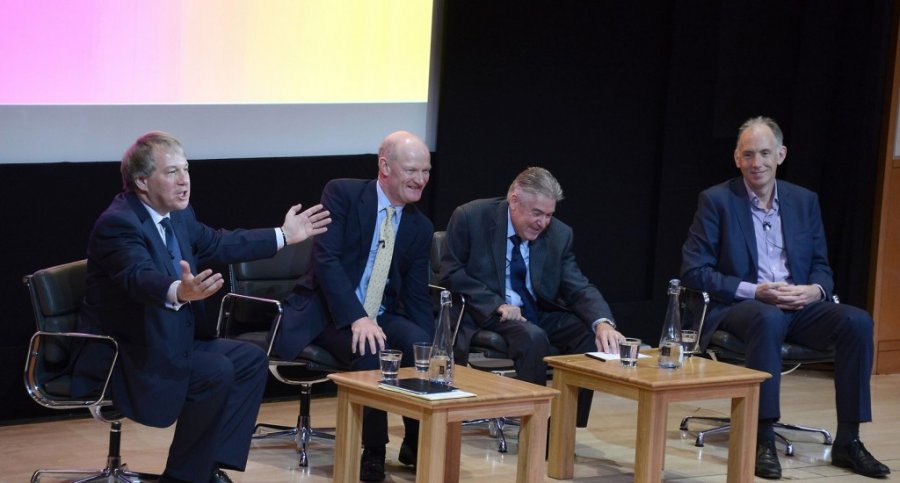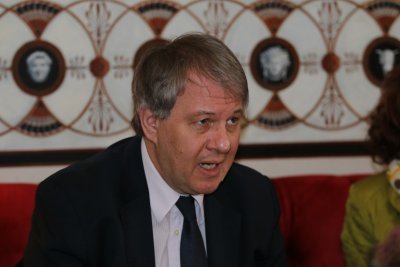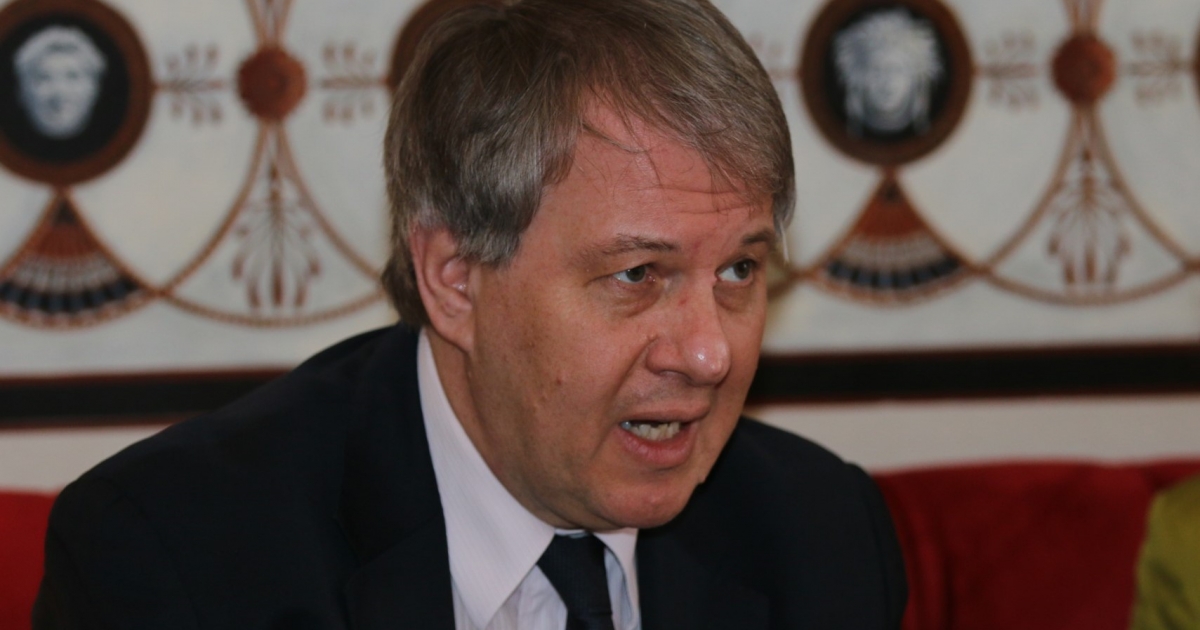Lucian Hudson: “Unless we take requisite action, the world is heading for recurring crisis”
GTF: In your international report to the UK Government, The Enabling State: Collaborating for Success, you discuss the importance of implementing human collaboration alongside the development of regulations and policies. How did your report arise, what was your motivation for writing it, and can you elaborate on the importance of collaboration?
After two years I had established an extensive network within the British diplomatic service and other governments to produce the first-ever international report on cross-sector collaboration. I am an unrepentant social democrat. As it is said in Lampedusa’s The Leopard, if things are to stay the same, they have to change. But my brand of social democracy has a twist: it is not the discredited fudge of the 1970s, seeking the lowest common denominator and settling for unsatisfactory compromise, but the pursuit of the best possible outcomes, now and for the future. It does involve tough choices, open, honest and constructive argument, and a practical commitment to resolving issues, rather than merely cope with them. I can identify with strong, collaborative leaders across the political spectrum and economic sectors. Such leaders are not just be decisive and focused on results: they have to appreciate complexity, exercise imagination and actively seek to be inclusive. I am an optimistic social democrat, because I believe our time will come! I share Gramsci’s idea of “pessimism of intellect, optimism of the will”. Unless we take requisite action, the world is heading for recurring crisis and catastrophe.
The question is not just one of extent and degree, but “traction” with the very sector to which any regulatory or policy framework applies. The Global Financial Crisis arose not because of a lack of regulation, but because of gaming behaviour that governments and institutions tolerated, and cultures of risk-taking that were encouraged, not only tolerated. Accountability was not felt through the system, and we are still paying the price. Our prosperity turns on business-friendly policies matched by preserving and developing ordered, tolerant, caring and sustainable communities.
GTF: You write of the importance for organizations to work interdependently rather than independently. What is it about this particular approach to tackling projects and issues that you believe will bring about success?
LJH: Any government or reasonably sized business necessarily not only interacts with a wider environment or ecosystem, but by default shapes and influences it by the actions it takes or does not take. So however deconflicted an organization is from what any other organization does, it has also to synchronise its activities with those of others, or needless conflict and chaos ensue. The debate in the UK about future membership of the European Union lacks any proper focus on the consequences of exit. Multinational oil and gas companies now understand this synchronising with other economic, political and social agents only too well, although for most, it has been a long and painful journey, particularly in developing effective stakeholder relationships with local communities and civil society organizations. My approach to collaboration is simple yet subtle: plan for what you need to achieve in such a way that you not only achieve a result for yourself, but an outcome that benefits you, your customers and your staff, and critically your wider community. Build into the brief and design of a project – not just its implementation- wider stakeholder engagement, capturing needs, interests, concerns and expectations. Focus on common ground, yet be very realistic about working through, or just putting up with, difference. Effective collaborations are like a good marriage: unity, but not uniformity. There is also space for a good family row!
GTF: Should collaboration only exist within projects/issues in which a government or organization believes it cannot accomplish its goals alone?
LJH: I see collaboration as a strategic and tactical tool, but also in some cases as a game-changer. Most of the time, collaboration exists at the end of a concept spectrum that starts with conflict, goes on to transaction, then negotation, or mediation, and ends with advanced negotiation, and active collaboration. Conflict is needed where an issue can only be resolved by one side winning, and the other losing. Good examples are the two World Wars. No compromise was possible with Hitler. Where collaboration can be a game-changer, not just a way of operating within a system but changing it, is through what I call the collaborator’s “gambit”: you have to give to get. It is a mark of leadership that a leader in business or in government makes a leap, and transforms a situation by reframing an opportunity or challenge, whilst being prepared to manage the consequences. A good example would be an Israeli Prime Minister, courageous and cunning, deciding not to look over his or her shoulder to appease the domestic right-wing, but instead forge a new understanding with the Palestinians and Israel’s neighbours on a sustainable two-state solution. The partnership with the Palestinian counterpart will be critical in breaking the deadlock.

GTF: How does one go about using his or her own strengths in a collaborative effort while also not “crowding out” the strengths of others?
LJH: Sibling rivalry theory highlights that one is more likely to have rivalry if one shines light in one place. Collaboration works on the same principle: more than one area is identified as important, so more than one person or organization derives the benefit. In some collaborative endeavours, the leadership baton passes from person to another. Belbin’s teamwork model and Losada’s research on high-performing teams provide further clues. Belbin established that for a team to be effective, each member of the team needs to play to strengths that work not just for the individual but the team. If you have a team full of go-getting types, and they all want to be in “shaper” roles, it is a recipe for disaster. However, if somebody who is strong on shaping, also has strengths, say as a resource-investigator (finding resources) or plant (offering ideas and fresh perspectives), using those “secondary” skills can be very productive. Put aside the politics, but it is clear that Dick Cheney and Al Gore could have discharged the duties of US President. But they played the No2 role skilfully, in so doing growing their influence. Losada’s work is very insightful. He demonstrated that high-performing teams achieve the right balance within a group between three pairs of opposites: outward versus inward looking; positive versus negative; and a spirit of inquiry versus advocacy. Losada arrived at an optimum ratio of 2.9, so in any group to be truly high-performing, one needs three times as many instances of asking questions, probing, assessing for every instance of driving a point home. Interestingly, one needs the inward-looking, the negativity and the advocacy, but to a much smaller degree. I am therefore delighted that introverts are making a come-back, because collaboration requires both extroverts and introverts, sharing of information and insight and bouncing off ideas, but also time to think things through properly and challenge assumptions, resisting the pressure of group-think.
GTF: What is one example of a particular project/issue in which collaboration among people/organizations brought about a successful resolution?
LJH: Under Tony Blair, the British Prime Minister, then Gordon Brown, serious inroads were made to link the need to take action on climate action with strengthening security, particularly energy security. The climate change agenda took off because there was a commitment to work with, and through, other governments, business and civil society sectors. Our diplomats were empowered to forge coalitions of interest to raise awareness and develop common policies and programmes. Dame Margaret Beckett, then British Foreign Secretary, supported by John Ashton, an unusual blend of top civil servant, expert and prophet, and myself, set about reprioritising and reframing climate change as integral to political and economic stability. UK diplomats worked with decision-makers, influencers and activists to cross a Rubicon to gain wider acceptance of the need for change. A good example is the alliance in the USA between the more left-leaning environmentalists and the more right-wing evangelical Christians who found common ground on the need for greater “custodianship of the planet”. Language is not a substitute for substance, but can express a fresh perspective, which in turn can reframe and redefine a problem.
GTF: Effective collaboration according to your paper is being “value-focused and understanding what value means to different people.” How do leaders successfully accomplish this across cultural divides?
LJH: During my time developing commercial joint ventures, I was mindful of the need to work across national and organizational boundaries, and deepen relationships. The BBC and Discovery formed a strategic alliance to establish new cable channels, and this turned on working effectively across three cultures: the two parent organizations and local players. In the mid-nineties, Latin America was already a lucrative potential market, hungry for translated foreign programming. Getting business done involved appreciating the distinctive economic opportunity of each country, and wide variations in appetites for different types of programmes. But what all negotiations had in common was a heavy element of developing rapport and information-gathering before formal deal-making. Western and Eastern societies, religious people and non-believers, all drink (in my view) from the same source of wisdom, even though our traditions bring out different areas of focus and emphasis. A leader needs to appreciate the need to understand before seeking to be understood. Culture operates at a non-rational or irrational level: engrained habits and ritual, deep ways of thinking and doing that we follow often unconsciously. We call this commonsense, nature, necessity – but really it is constructed, evolved human drama, ideology in its most effective guise, disguised, as unquestioned fact. Not surprisingly, the best tip for working with other cultures is to show appreciation for local norms, before pursuing one’s own objectives. My model inverts that pyramid, and proposes that each of us is a meaning creator, creators and caretakers of our own universe, sometimes agents, sometimes victims, partners with the environment around us, attaching value to some things and not others. We can spend a whole lifetime not sure what we value, but this does not take away from the need to engage with this most human of pursuits. This is regardless of wealth, power and influence. It is somewhat patronising and counter-productive to suggest that one needs to have a certain degree of wealth or financial independence to exercise moral choice, even though one can see that choice limited by circumstances. Choices are made in conditions of affluence or poverty, and collaboration appeals to the autonomy that resides in each individual and community to exercise different degrees of judgment and discretion. A spirit of collaboration sanctifies that space. Ultimately, this is what makes a difference, not set regulations and policies, which can only set limits, not determine motivation. The child psychologist D.W. Winnicott said that play was not the opposite of work but of coercion. Collaboration frees us up to play, in that sense, applying creativity to situations.
GTF: What is “effective partnership” and how does it correspond to collaboration?
LJH: Partnership is a type of collaboration where two parties or more treat one another as equals to achieve something together. Just as with collaboration, one would expect to each partner to appreciate that their partnership has a shared goal; each brings complementary and mutually supportive skills; each puts in similar investment of resources, financial or in kind; each expects a fair and proportionate return; risks and differences of style and culture are managed constructively.
Published: 09/07/2014




